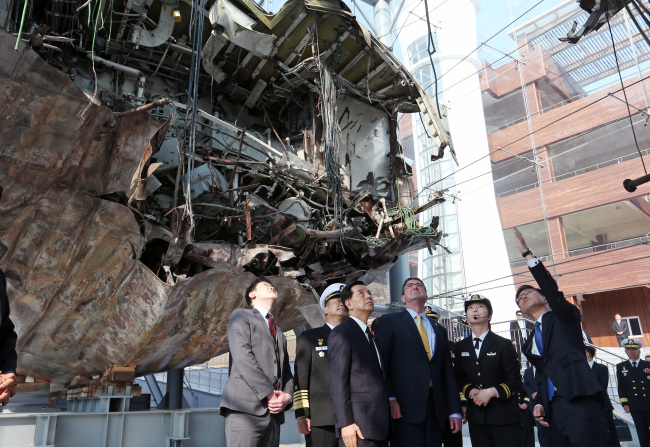U.S. Defense Secretary Ashton Carter said Friday that Washington was not in a position to discuss the issue of the Terminal High-Altitude Area Defense system, a core element of the U.S. missile defense program, as it is still in production.
His remarks came amid raging controversy here over the U.S.’ potential deployment of THAAD to the Korean Peninsula, which Beijing has repeatedly opposed on the grounds that it would undermine its security interests and raise military tension in the region.
“We are not at a point yet to begin any discussions with anyone around the world about where the THAAD batteries in production are now going,” he told a joint press conference after his talks with South Korea’s Defense Minister Han Min-koo.
His remarks came amid raging controversy here over the U.S.’ potential deployment of THAAD to the Korean Peninsula, which Beijing has repeatedly opposed on the grounds that it would undermine its security interests and raise military tension in the region.
“We are not at a point yet to begin any discussions with anyone around the world about where the THAAD batteries in production are now going,” he told a joint press conference after his talks with South Korea’s Defense Minister Han Min-koo.

“It is that simple. It is where we are in terms of technical progress of the program.”
Although the THAAD issue was off the official agenda, speculation had persisted that the two ministers would touch on the issue due to a heated debate over whether Seoul should consent to the deployment of THAAD.
Mindful of the possible impact of THAAD on its relations with Beijing, Seoul has so far taken a cautious stance, arguing that there were “no consultations between the allies, no request from the U.S. for any talks, and no decision reached.”
During their talks, Kim and Carter discussed ways to bolster security cooperation against North Korea’s evolving missile and nuclear threats. They also talked about joint efforts for the “conditions-based” transfer of wartime operational control, which is expected to occur in the early or mid-2020s.
Touching on the three-way security cooperation between Seoul, Washington and Tokyo during the talks, Carter expressed hopes that Seoul and Tokyo can “imagine the future” while seeking historical reconciliation.
In a media interview in Japan, the first leg of his trip to Asia, Carter made remarks that were interpreted here as his calls for the three nations to look toward the future rather than being bound by the past.
His remarks triggered criticism here with some arguing that he seemed to encourage Seoul to let go of the past although Tokyo has yet to sincerely apologize for its wartime atrocities including the sexual enslavement of Korean women during World War II.
Carter clarified that his remarks referred to future military cooperation, not the historical legacy issues.
“I was referring to the agreements to share information in the future among the three militaries, which I think has a great promise for the security of all of us. I was not referring to the past,” he said at the news conference.
“We have a lot of respect for historical legacy issues in this region, and we think it is important and we certainly hope for healing and reconciliation with respect to these issues.”
After the news conference, Han and Carter visited the Second Fleet Command in Pyeongtaek, Gyeonggi Province, where the wreckage of the sunken corvette Cheonan is displayed. Carter became the first Pentagon chief to visit the memorial.
“This reminds us of the importance of our alliance, a long-standing alliance that stands for peace and stability in this part of the world,” he said, looking at the damaged parts of the 1,200-ton Cheonan on display. “This is a sad reminder that that kind of peace and stability is not automatic, it has to be defended.”
By Song Sang-ho sshluck@heraldcorp.com)
-
Articles by Korea Herald







![[Graphic News] More Koreans say they plan long-distance trips this year](http://res.heraldm.com/phpwas/restmb_idxmake.php?idx=644&simg=/content/image/2024/04/17/20240417050828_0.gif&u=)
![[KH Explains] Hyundai's full hybrid edge to pay off amid slow transition to pure EVs](http://res.heraldm.com/phpwas/restmb_idxmake.php?idx=644&simg=/content/image/2024/04/18/20240418050645_0.jpg&u=20240419100350)






![[From the Scene] Monks, Buddhists hail return of remains of Buddhas](http://res.heraldm.com/phpwas/restmb_idxmake.php?idx=652&simg=/content/image/2024/04/19/20240419050617_0.jpg&u=20240419175937)

![[KH Explains] Hyundai's full hybrid edge to pay off amid slow transition to pure EVs](http://res.heraldm.com/phpwas/restmb_idxmake.php?idx=652&simg=/content/image/2024/04/18/20240418050645_0.jpg&u=20240419100350)

![[Today’s K-pop] Illit drops debut single remix](http://res.heraldm.com/phpwas/restmb_idxmake.php?idx=642&simg=/content/image/2024/04/19/20240419050612_0.jpg&u=)